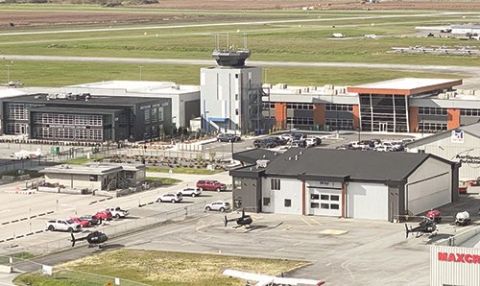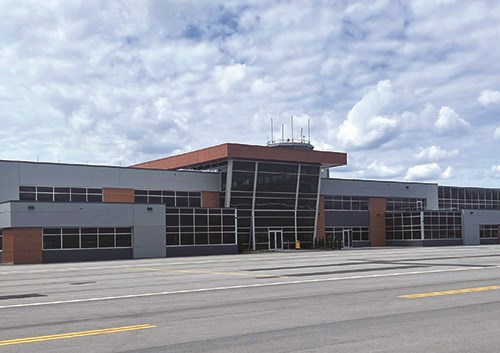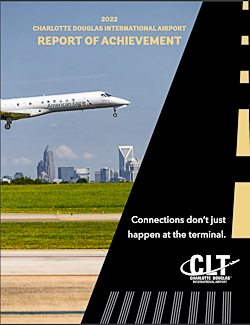Significant Development is Afoot at Pitt Meadows Regional

A bustling general aviation airport near Vancouver, BC, has embarked on an aggressive expansion program, with all eyes firmly focused on landing more—and more diverse—business over the years to come. Leaders at Pitt Meadows Regional Airport (YPK) are convinced today’s growth-focused initiatives will shape tomorrow’s reality, especially when potential tenants see the airport’s timeless natural surroundings.
“We’re in a very enviable location,” says YPK General Manager Guy Miller. “Looking out of my office, I have a 180-degree view of snow-capped mountains. It’s a beautiful locale, and that’s what we have to offer.
“We’re really trying to take advantage of the region’s amenities, and we want to make this airport a bit special and a bit different.”
|
facts&figures Project: Airportwide Development Location: Pitt Meadows (BC) Regional Airport Business Mix: Flights schools; aircraft maintenance facilities; general & corporate aviation flights; commercial charters & limited scheduled service Objective: Increase corporate traffic Recent Improvements: New $12 million terminal; first on-field FBO; 2 general aviation hangars; taxiway improvements; new 50,000-liter jet fuel tank; new flight training center (14,000 sq. ft.)
Upcoming Projects: Runway & airfield improvements begin this Aug.; sitework completed & permitting in process for 20-acre helipark; 2024 groundbreaking slated for 11-acre development Airport Footprint: 900 acres Available for Development: 200 acres Airport Owner & Operator: Pitt Meadows Airport Society, not-for-profit joint venture between cities of Pitt Meadows & Maple Ridge, BC Fixed Base Operator/Jet Fuel Provider: Integrity Flight Support Runways: 3 (all asphalt), ranging from 2,484 ft. to 4,962 ft. long Air Traffic Control Services: 7 a.m.- 11 p.m. 2022 Operations: 127,284 (9th-most in Canada) |
Miller knows it will take more than stunning vistas of the North Shore Mountains to distinguish YPK. So he’s focused on something more tangible: an ongoing series of buildouts and rehabilitation projects to refresh what had become a “tired” facility. Older hangars were recently demolished as leases expired, and new tenants are making commitments to build modern replacements ranging from 6,000 to 100,000 square feet. With nearly one dozen projects in development or recently completed, Miller notes that YPK will soon have the infrastructure to meet users’ needs for at least the next 30 years.
“As we build our viability and credibility up, we’ll be able to attract larger players in the not-too-distant future,” he says, predicting more than $100 million in new hangar facilities alone over the next four to five years.
Knowing and Growing the Right Niche
Nestled along the northern banks of the Fraser River, YPK is located approximately 32 kilometers (20 miles) east of downtown Vancouver, in a thriving metro area with nearly 2.6 million people. The opening of a bridge across the Pitt River in the late 1950s brought highway connectivity between suburban Pitt Meadows and Vancouver’s central business district, and Canadian transportation leaders quickly recognized the value of adding air connectivity, as well.
By 1963, federal aviation officials had opened a small airfield in Pitt Meadows to serve as a satellite for the growing Vancouver International Airport (YVR).
6 decades later, YPK remains a thriving general aviation facility that caters primarily to flight training operators, aircraft maintenance businesses and commercial charters, including helicopter tours. Its air traffic control tower directs pilots along three asphalt runways that range from nearly 2,500 feet to almost 5,000 feet in length. A riverside area supports floatplane operators such as Harbour Air, which offers seasonal weekday service to Victoria Island.
Just to the west, YVR remains the region’s primary commercial gateway with more than 19 million passengers in 2022. Nearby Abbotsford International (YXX) is also a strong player with nearly 1 million annual passengers. Both enjoy ample service from Air Canada, WestJet, Swoop and Flair Airlines. Even without large commercial carriers, YPK remains an integral cog in the national aviation system with close to 130,000 movements last year.
 “We are usually in the top dozen busiest airports (in Canada),” Miller says, adding that several flight schools—some with as many as 25 aircraft each—keep the skies above YPK buzzing. “We’re now trying to move corporate traffic here and take the load off Vancouver and Abbottsford, which are certainly more interested in the bigger aircraft. We have a market we can really open up here.”
“We are usually in the top dozen busiest airports (in Canada),” Miller says, adding that several flight schools—some with as many as 25 aircraft each—keep the skies above YPK buzzing. “We’re now trying to move corporate traffic here and take the load off Vancouver and Abbottsford, which are certainly more interested in the bigger aircraft. We have a market we can really open up here.”
A key part of the strategy to do so is leveraging the airport’s existing footprint. Developable land along the Pacific coastline from British Columbia down to Southern California is scarce—and therefore expensive. YPK sits on 900 prime acres, with more than 200 still available for development. Miller’s team will hit the trade show circuit over the next couple of years to raise awareness of YPK among businesses and corporations seeking to expand in Canada, or relocate their Pacific Rim aviation operations. If all goes according to plan, portions of the blueberry fields that currently dot the airport’s northern acreage will someday house aircraft maintenance, repair and overhaul facilities.
Because Pitt Meadows is close to a major West Coast metro area, yet still far enough away from central Vancouver to offer more affordable housing options, Miller says the community and its airport present compelling options for aviation businesses with 30 to 100 employees.
Integrity Flight Support recently became YPK’s first fixed base operator and sole jet fuel provider. The company offers ramp handling services, passenger and crew lounges, concierge services, office and meeting rentals, aircraft parts distribution, private aircraft management and crew cars or limousine service for guests.
This spring, the airport also launched a four-month airfield improvement project that includes milling, base repairs, repaving and line painting for several taxiways. Work on Runway 26L-08R begins in August. Ramps, apron lighting, drainage ditches, signs and fencing will all receive upgrades, and a new 50,000-liter jet fuel tank (about 13,200 gallons) was recently installed.
“It’s been a really robust season for us, in COVID and coming out (of the pandemic),” Miller says. “We’ve never really slowed down as far as development goes.”
Corporate Terminal
The most evident sign of YPK’s redevelopment is a new 50,000-square-foot terminal that opened in June 2022. It was designed with an emphasis on corporate travelers more so than commercial flyers to help YPK stand apart from other regional airports in Canada and United States.
“It’s our flagship, and shows we’re open for business and are serious about infrastructure for the future,” Miller says.
Pacific Aircraft Services, a subsidiary of construction contractor and equipment provider RDM Enterprises, owns and operates the new terminal. RDM is located just 30 minutes south of the airport, and Ron Madsen, the company’s founder and president, was largely inspired to build at YPK due to challenges he had encountered flying through the region’s largest airport.
 “I had a trip through Vancouver International Airport a while back on a private aircraft,” Madsen says. “It took two hours to get there, and then we spent another 30 minutes waiting on the airfield because there were so many commercial airliners there.”
“I had a trip through Vancouver International Airport a while back on a private aircraft,” Madsen says. “It took two hours to get there, and then we spent another 30 minutes waiting on the airfield because there were so many commercial airliners there.”
Convinced there had to be a better solution, Madsen worked with Miller and a developer from Blackfalds, AB, to build YPK’s new $12 million terminal. Having previously flown through YPK, and remembering Miller from his previous tenure at another British Columbia airport where RDM invested, Madsen says the decision to invest at YPK was easy.
Like Miller, Madsen cites the airport’s geography as a key factor. “Pitt Meadows is close to everywhere,” he says, rattling off Vancouver suburbs such as Coquitlam, Langley and Surrey. “You can get (to YPK) in 20 minutes from anywhere. It’s so convenient.”
The new Pacific Aircraft Services terminal sought to maximize the airport’s location. Five doublewide trailers, in place for more than two decades, are now gone. In their place is a modern two-story building with floor-to-ceiling windows and an interior sky bridge with striking views of the airfield and beyond. Harbour Air leases space there, and the new Whiskey Charlie café is open daily.
Vancouver Aviation College sits just behind the terminal, having recently replaced a 45-year-old hangar with a new 14,000-square-foot, two-story facility for pilot training.
Beyond the terminal, YPK is developing a 20-acre helipark near the airport’s northwestern corner. Site work is complete and permitting is expected to take place later this year on the first of five helicopter hangar complexes, each in the 80,000- to 90,000-square-foot range. SKY Helicopters is already building a 40,000-square-foot hangar to grow its popular aerial sightseeing charter operation.
Miller reports that YPK’s eastern perimeter will soon have six to seven new general aviation structures, each featuring a mix of box or T hangars. Two are fully complete, and a third is currently under construction.
He’s also excited about a waterfront project on 11 acres outside the main airport entrance that is set to break ground in 2024. The currently unnamed development will feature a riverfront boardwalk and restaurants, microbreweries, boutique retail and possibly a spa-oriented hotel—all attractive lures for the airport’s desired corporate clientele. Of equal importance, the waterfront venue will also be an amenity for nearby residents.
“We want to bring the community to the airport, and the airport to the community,” Miller explains.

While many municipalities call their airports community assets, that’s literally the case regarding YPK. The Canadian government transferred control of the facility in 1999 to the Pitt Meadows Airport Society, a not-for-profit organization with six members appointed by the cities of Pitt Meadows and Maple Ridge. The Airport Society owns and operates the airport, but owns no buildings and receives no taxpayer assistance. All revenue and profits, primarily from land leases, are reinvested back into YPK.

That’s not to say money doesn’t also flow out of the airport. An economic impact study by InterVISTAS Consulting Group determined that YPK contributes $45 million toward Canada’s annual gross domestic product and provides nearly 600 jobs, directly
or indirectly, near its 20,000-resident home city.
“It’s wonderful to see the airport recognized for the exceptional work that has gone into its redevelopment these last few years, and it motivates us to continue towards our long-term goals for YPK as a provider of quality air services and vibrant business activity in the North Fraser region,” says Mark Roberts, chief administrative officer for the city of Pitt Meadows and president of the Pitt Meadows Airport Society.
Adds Miller: “The community is really excited about the airport, and they understand the value of this airport. It’s not rocket science; we’re simply putting some tender loving care into these assets and showing what aviation can bring to the broader community.”
|
Father and Son Share Same Upward Trajectory When it comes to aviation in Canada, the Miller family has forged an unquestionable legacy. Guy Miller, general manager of Pitt Meadows Regional Airport (YPK) for the past five years, is a true aviation lifer. His impressive resume includes stints as an F-18 fighter pilot in the Royal Canadian Air Force (RCAF), followed by lengthy stretches as a Boeing 747 pilot and simulator instructor for Cathay Pacific Airways based in Hong Kong. But his career path wasn’t happenstance. In fact, some say it was somewhat preordained by the exploits of his father, George Miller, one of Canada’s most decorated aviators. Born in Montreal in 1936, George enlisted in the RCAF fresh out of high school. Within a year, he had become one of the youngest Canadian pilots to serve an overseas tour of duty during his Cold War posting in Zweibrücken, West Germany.
George served in the RCAF for 35 years, including time as a leader of its Golden Hawks and Snowbirds air demonstration squadrons (groups akin to the U.S. Air Force Thunderbirds or U.S. Navy Blue Angels). He later launched an air show company that produced Canada’s first National Capital Air Show in the 1990s, and was inducted into Canada’s Aviation Hall of Fame in 2015. “I grew up with my dad and got to see the military side,” Guy says. “Once I got out of university, I went right into the RCAF and flew Hornets.” Guy has followed in his father’s footsteps—twice—during his post-military career as well. When George was serving as manager of Langley Regional Airport (YNJ) in southern British Columbia, he asked Guy to return from Asia in 2005 to act as his deputy manager. Guy agreed, and years later, George took an interim assignment overseeing YPK and was later named general manager. Completing yet another portion of the family legacy, Guy was chosen as George’s successor there in June 2018. “We did a lot of redevelopments at YNJ, very similar to what we’re now doing at YPK. And I think a few individuals liked what they saw,” Guy says of landing his current role. The younger Miller says the skills he acquired over three decades in the industry serve him well while running YPK. Without a large staff at his disposal, Guy believes it’s important to be a jack-of-all-trades and understand the small airport niche from multiple perspectives. “Managing a busy community airport is very different than managing a Tier 1 airport like Ottawa or Vancouver,” he says. “You have to come to the table with a bit more depth on what’s happening in aviation—not just business and marketing savvy, but also operationally. “There’s a whole body of knowledge you have to have, including understanding how city hall works,” he continues. “You’ve got to meet with people, talk with people and let them see what these community airports can really bring.” An appreciation of general aviation is one of many lessons Guy learned from his father, who is still healthy and enjoying a well-earned retirement “just down the road” from YPK. After all, in the Miller family, no one is really ever too far from an airport. |
2022 Charlotte Douglas International Airport Report of Achievement
 Giving back to the community is central to what Charlotte Douglas International Airport and its operator, the City of Charlotte Aviation Department, is about, and last year was no different.
Giving back to the community is central to what Charlotte Douglas International Airport and its operator, the City of Charlotte Aviation Department, is about, and last year was no different.
Throughout 2022, while recovering from the COVID-19 pandemic, we continued our efforts to have a positive impact on the Charlotte community. Of particular note, we spent the year sharing stories of how Connections Don't Just Happen at the Terminal - from creating homeownership and employment opportunities to supporting economic growth through small-business development and offering outreach programs to help residents understand the Airport better.
This whitepaper highlights the construction projects, initiatives, programs and events that validate Charlotte Douglas as a premier airport.
Download the whitepaper: 2022 Charlotte Douglas International Airport Report of Achievement.









